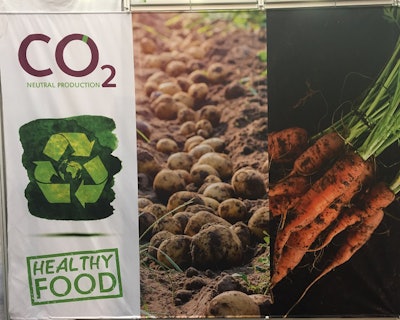
Most U.S. consumers consider sustainability in the foods they eat important to some degree, according to a recent survey conducted by C.O.nxt and Menu Matters. With pets being part of the family and, consequently, consumers often viewing pet food very similarly to how they look at their own food, it stands to reason the same sustainability findings could extend to what people feed their pets.
Among 750 consumers surveyed, a full 80% said they consider sustainability in their food somewhat, very or extremely important. Looking at just the two top levels, very or extremely important, nearly 54% chose those survey responses. Not surprisingly, younger consumers were more likely to rate sustainability high, with 65.4% of 18-to-29-year-olds saying it was very or extremely important and 60.6% of 30-to-44-year-olds saying the same.
Social and economic issues as important as environmental
Maeve Webster, president of Menu Matters, a food industry consultancy, said in a related webinar that this heightened interest represented a post-pandemic shift in consumer perspectives. “Sustainability was pushed to a little bit of the background during the height of the pandemic because hygiene, sanitation and those types of issues became more important,” she said.
Now, it’s not only moving back toward the center of attention, but consumer perceptions of sustainability are also expanding beyond environmental concerns to include social and economic issues. In the latter category, that includes pay equity and working conditions for food companies’ employees, Webster said.
In fact, almost half of the consumers surveyed, 46%, chose social and economic matters over environmental issues, at 39.5%, as being important. The specific social issues identified as important included commitment to addressing environmental footprint of ingredients, chosen by 44.1%, and commitment to animal care and welfare standards, at 41.5%.
Ranking behind those were matters like commitment to transparent reporting of goals (31.8%), societal commitment to local communities and global needs (25.6%) and diversity, equity and inclusion commitments regarding staff and suppliers (25.4%).
‘Greenwashing’ and price not a concern?
Traditionally, a risk for brands or companies touting the sustainability of their products or practices was that consumers might perceive it as mere marketing fluff, not backed by facts or actions. This phenomenon is known as greenwashing.
Yet according to this new study, consumers increasingly trust organizations making sustainability claims, with 42.4% saying they somewhat or completely trust claims. Interestingly, younger consumers, those under 44, now are more likely to trust such claims, compared to respondents over 60. The more trusting consumers are the ones more likely to rate sustainability as very important, Webster pointed out.
Another question around sustainability has been whether consumers are truly willing to pay more for sustainable products. The survey again showed a higher likelihood among younger groups, with a whopping 73.2% of 18-to-29-year-olds saying they’re definitely or probably willing to pay more, and the same for 58.5% of 30-to-44-year-olds and 52.7% of 45-to-60-year-olds. The “definitely or probably willing to pay more” percentage for those over 60 dropped to 39.9%, with the overall percentage, for all respondents, at 52.2%.
Of course, what people say in a survey does not always match up with their actual behavior, especially when it comes to spending. “Pricing research can be tricky,” said Mark Gale, chief growth officer at C.O.nxt, a food marketing and research agency. “Consumers do not always do what they say. These same age groups show high interest in food and sustainability and concern over specific topics, though. The point is worth noting.”
Much of this research lines up with pet food consumers are saying and, in some cases, doing today. As my colleague Lindsay Beaton put it, sustainability is here to stay for pet food, human food and most other consumer categories.
















